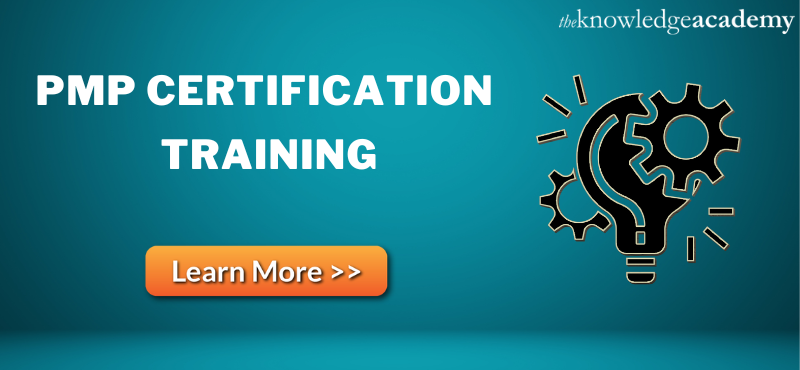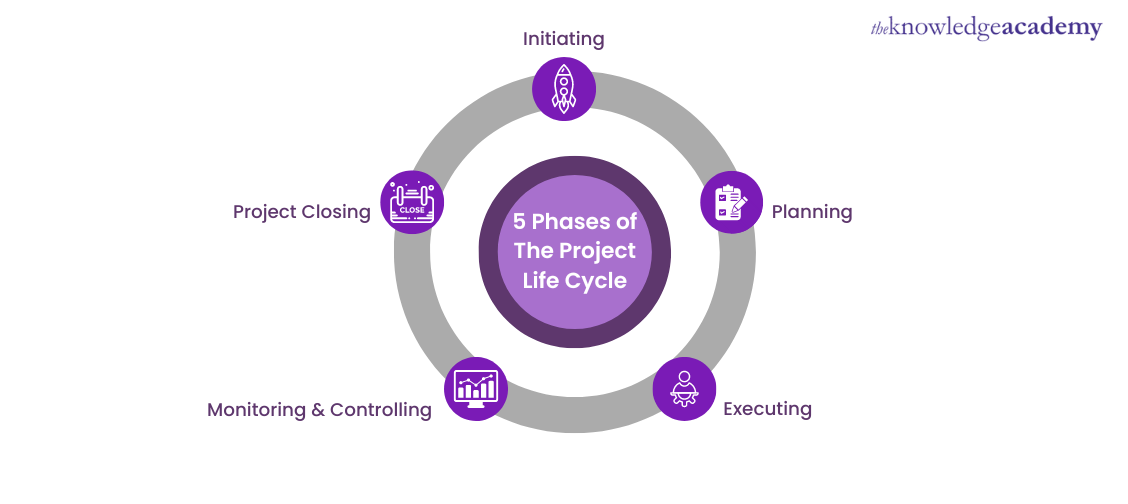We may not have the course you’re looking for. If you enquire or give us a call on 01344203999 and speak to our training experts, we may still be able to help with your training requirements.
Training Outcomes Within Your Budget!
We ensure quality, budget-alignment, and timely delivery by our expert instructors.

Projects are divided into five phases according to the Project Management Body of Knowledge (PMBOK). You may think it is executed chronologically by the word ‘phase,’ but it’s not always the case. The project managers shift directly to the planning phase whenever there is a project change. Therefore, they are formally referred to as process groups.
When we think of a Project manager’s job responsibilities, it seems like they only assign tasks, remind deadlines and keep setting up status meetings. But that’s not the case in real life. Managing a project, regardless of its size or scope, is challenging. Project managers are responsible for effectively executing the five process groups of Project Management and delivering the project on time, ensuring maximum client satisfaction.
These five process groups of Project Management are described in the A Guide to the Project Management Book of Knowledge (PMBOK Guide). PMBOK Guide is a publication of the PMI. It assists Project managers in learning the best practices of Project Management and helps them network with Project Managers around the world.
In this blog, we will understand the five Phases of Project Management Life Cycle in a much-simplified manner. The project managers shift directly to the planning phase whenever a project changes.
Table of Contents
1) What is Project Life Cycle?
2) What are the Five Phases of Project Management Life Cycle?
a) Initiating Phase
b) The Planning Phase
c) Executing Phase
d) Monitoring and Controlling Phase
e) Project Closing Phase
3) Why are Project management phases important?
4) Conclusion
What is Project Life Cycle?
Defining the Project Life cycle aids Project Managers in successfully managing any complicated project from start to finish. The PMBOK Guide says that the elements of Project Life Cycle phases should be defined as these:
1) What the project will achieve,
2) The project deliverables it will produce
3) The team members engaged in each project activity, and
4) How Project Manager will oversee and approve each project phase
There are five project management phases in the project life cycle. Each of these project phases represents a group of interrelated processes that must take place for the successful completion of a project.

What are the Five Phases of Project Management Life Cycle?
Each stage of the project life cycle has a unique focus distinct from the others. A project phase is a grouping of various project management activities. In the Project Life Cycle, their connection is frequently sequential, and each phase concludes with completing one or more project deliverables.
There are 5 Phases of Project Management Life Cycle.

1) Initiating Phase
2) The Planning Phase
3) Executing Phase
4) Monitoring and Controlling Phase
5) Project Closing Phase
1) Project Initiation:
The Project Initiation Phase carries the burden to create the perfect start that will lead the Project to fulfil the desired set of business goals. It makes sure that everyone ranging from the team members to the Stakeholders contribute, are contributing to the success of the project. Here are some of the most asked questions about this phase:
a) What is the primary objective of this phase?
b) Who is involved in it?
c) How does the Project Manager contribute to this phase?
The main task carried out in this phase would be the introducing and authorising of the project idea. The team members decide on various aspects of the idea and it is evaluated by the project sponsor. If the project is authorised, then it is free to proceed.
Next, the documentation process is initiated by the Project Manager. This will contain all the facts and predictions regarding deliverables, risks, estimated cost, resources, and more. Apart from the documentation process another integral factor of this phase is the Project Charter.
The Project Charter contains all kinds of information, starting from the project’s conception to success criteria. It also comprises details of authorisation, defines the powers of project managers, and records the progress of your project.
Out of the list of important documents formulated in the Initiation phase, the Stakeholder Register is a rather important one. As the name suggests, it contains information about the stakeholders of the Project. It also carries data on all the organisations and groups that carry an interest for the project.
Want to gain a certification that demonstrates your Project Management skills and experience? Sign up for PMP Certification Training!
2) Project planning:
The Project Planning Phase is used to plan the treatment of all the tasks that will eventually lead to the completion of the Project. The team members collaborate with the Project Manager to decide on the timeline of the tasks and estimate the budget. Here are some commonly asked questions about this phase that will be answered later:
a) How many steps of the project are going to be involved in the planning?
b) What kind of documents are created in this phase?
c) How important is the project planning phase?
While the resource plan, communications plan, and project schedule are designed by the team members, the responsibilities of the members and stakeholders are decided by the Project Manager. Then, depending on the availability of resources and the priorities of the client, the project scope is finalised.
The other documents or plans finalised during this time involves the Project Plan, Requirements List, Work breakdown Structure, Communications Management Plan, and more. These plans help in increasing performance efficiency of team members.
There are various approaches for establishing project goals, but S.M.A.R.T. and C.L.E.A.R. are the most common.
S.M.A.R.T. Goals:
Specific – To set clear goals, you must answer: what, who, where, when, which and why.
Measurable - Develop standards for measuring the success of an objective
Attainable - Determine the most essential goals and the steps required to accomplish them.
Realistic - You should be willing and capable of working toward a certain objective.
Time - Establish a timetable for achieving the set goal
C.L.E.A.R. Goals:
Collaborative - The goals defined should encourage project teams to work together.
Limited - Goals should be limited in scope and time to keep things manageable.
Emotional - Goals should tap into workers' passions to improve job quality.
Appreciable - Break primary goals into smaller chunks that can be completed quickly.
Refinable - Be flexible and revise goals when new changes occur in the project.
In this phase, determining baselines or performance benchmarks is also essential. These are developed based on a project's scope, timeline, and cost. A baseline is required to establish whether or not a project is on schedule.
Each of these plans are to be crafted with care. For instance, the Communications Management Plan is developed for the smooth communication with stakeholders. The tiniest miscommunication or misinterpretation of data with stakeholders can cost your project a ton of money.
3) Project execution:
All the initially planned tasks are performed in the Project Execution Phase. It is also known as the Implementation Phase, as team members implement their designated responsibilities for a successful Project completion. The following are some of the questions that when answered, shall reveal the objectives of the project execution phase:
a) Who supervises the execution?
b) Are there any additional documents created in this phase?
c) How is it different from the project monitoring phase?
The Project Manager supervises every aspect of the Project to keep track of its progress. Project Management software is used heavily during this time to delegate heavy work among team members equally, to increase efficiency.
The Project Execution Phase is the phase where many documents are made. This is because it is highly likely to attain new information along the way, and this needs to be updated on existing documents or added to new ones that will help the project.
Documents such as Quality Assurance paperwork, meeting minutes, and Work Orders are created during this PMP phase of the project management life cycle. While the Project monitoring and controlling phase have separate needs, these two stages frequently are performed simultaneously.
4) Project Monitoring and control:
After designing and planning the project it is executed; the next gradual step is to ensure that the tasks are being performed correctly and efficiently. The progress of the Project is tracked in the Project Monitoring and Control Phase. Here are some of the frequently asked questions about this phase:
a) What aspects of the project require tracking or monitoring?
b) If a flaw is detected, how is it reported and where?
c) What steps are to be followed to ensure thorough monitoring?
The team members can track where, when, and how the resources are being used to check if it is compatible with the original Project Plan. Documents like spending records and change management documents are made use in this phase.
If there are any inconsistencies with the functioning of teams, the issues are reported and suitable solutions are suggested to improve the Project manager. Constant monitoring helps discover faults early on, which can be dealt with instantly, decreasing turbulence in the long run. Project managers use the following Key performance indicators (KPIs) to assess whether a project is on schedule:
a) Quality deliverables
b) Project objectives
c) Project performance
d) Timeline and cost tracking
Maintaining a careful record on all the activities within your team can prove useful at various steps. For instance, if additional resources are needed, the earlier collected data can help justify your needs and hasten the request to be processed.
Also, check out our blog to prepare the top PMP interview questions to ace your interview!
5) Project Closing:
As the name suggests, this is the last phase of the Project Life Cycle. It marks an end to all the activities initiated from the first phase. The following are some common questions asked about the closing phase:
a) Do all the activities come to an end?
b) Who all are involved in this phase?
c) Will there be a detailed evaluation involved?
Any kind of task ranging from agreement termination to submitting final deliverables belong to this phase.
It is not necessary that all the projects entering the Project Closing Phase to be deemed complete. There are chances for the Project to be cancelled, terminated or even transferred to a new organisation.
This phase begins with informing the involved parties about the status of the project. For instance, the Project Manager is responsible for communicating the Project status to all the stakeholders. Even the team members are alerted of the overall status and follow-up activities, that require completion. The Project team must meet a budget and write a final project report. Finally, they must gather all project deliverables and documents and keep them in a single location.
Most of the time, in this final phase, it is suggested for teams to self-evaluate their work and find needful improvements for the success of future projects. Potential faults and areas of improvement can be found in the documents that hold data collected throughout the Project. Good organisation skills can pay off in this phase, as this is important to retrieve required folders hassle-free.
Why are Project Management Phases important?
a) Every project goes through the five Project Management phases of the project life cycle regardless of size or scope. Dividing projects into the above-mentioned five Project Management phases is an excellent method for Project Managers to manage the team's focus.
b) They help to allocate budget and resources and align the whole project life cycle with customers and stakeholders. The five phases may seem like an elaborate process to go through, but if approached with an efficient team, it can offer the best results.
c) The use of phases to complete projects can help in increasing productivity of team members. Delivering desired results by the end of a phase helps in finishing tasks quicker and thereby leaving time to prepare for the next phase.
d) As each phase will have a fixed set of responsibilities assigned to certain members, it forms a framework that can be easily followed by the team. Another benefit of segmenting work in phases is that it helps keep track of each activity pursued by the members. It also helps to identify any faults in the current plan.
e) While the PMBOK suggests assigning project phases based on the project life cycle, project teams can develop their methodology based on their industry, organisational regulations, and other relevant considerations.
Also, check here to learn about PMP audit process in detail!
Conclusion
We hope you have a clear view of what Project Managers do under these Project management phases. Diving the project under each phase gives the team a framework to operate, plan and execute the project. Let us know in the comments below if you have more questions regarding the project management phases.
Start your preparation here – sign up for the Introduction to Project Management course!
Frequently Asked Questions
Upcoming Project Management Resources Batches & Dates
Date
 PMP® Certification Training Course
PMP® Certification Training Course
Sat 4th May 2024, Sun 5th May 2024
Tue 7th May 2024
Mon 13th May 2024
Sat 18th May 2024, Sun 19th May 2024
Mon 20th May 2024
Tue 28th May 2024
Mon 3rd Jun 2024
Mon 10th Jun 2024
Sat 15th Jun 2024, Sun 16th Jun 2024
Mon 17th Jun 2024
Mon 24th Jun 2024
Sat 29th Jun 2024, Sun 30th Jun 2024
Mon 1st Jul 2024
Mon 8th Jul 2024
Sat 13th Jul 2024, Sun 14th Jul 2024
Mon 15th Jul 2024
Mon 22nd Jul 2024
Sat 27th Jul 2024, Sun 28th Jul 2024
Mon 29th Jul 2024
Mon 5th Aug 2024
Sat 10th Aug 2024, Sun 11th Aug 2024
Mon 12th Aug 2024
Mon 19th Aug 2024
Sat 24th Aug 2024, Sun 25th Aug 2024
Tue 27th Aug 2024
Mon 2nd Sep 2024
Sat 7th Sep 2024, Sun 8th Sep 2024
Mon 9th Sep 2024
Mon 16th Sep 2024
Sat 21st Sep 2024, Sun 22nd Sep 2024
Mon 23rd Sep 2024
Mon 30th Sep 2024
Sat 5th Oct 2024, Sun 6th Oct 2024
Mon 7th Oct 2024
Mon 14th Oct 2024
Sat 19th Oct 2024, Sun 20th Oct 2024
Mon 21st Oct 2024
Mon 28th Oct 2024
Sat 2nd Nov 2024, Sun 3rd Nov 2024
Mon 4th Nov 2024
Mon 11th Nov 2024
Sat 16th Nov 2024, Sun 17th Nov 2024
Mon 18th Nov 2024
Mon 25th Nov 2024
Sat 30th Nov 2024, Sun 1st Dec 2024
Mon 2nd Dec 2024
Mon 9th Dec 2024
Sat 14th Dec 2024, Sun 15th Dec 2024
Mon 16th Dec 2024







 Top Rated Course
Top Rated Course



 If you wish to make any changes to your course, please
If you wish to make any changes to your course, please


